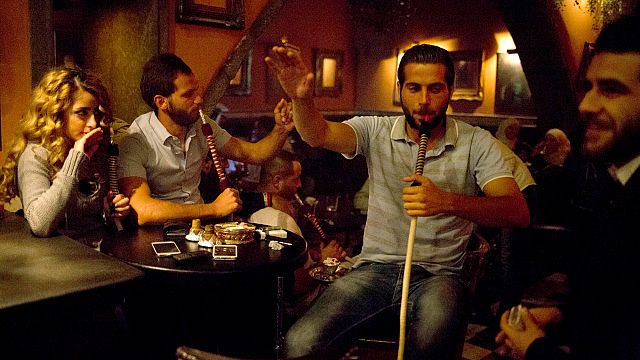Bars in the Christian areas of Damascus have been gripped by fear following a series of attacks targeting establishments serving alcohol. The quaint streets of Bab Sharqi in the Syrian capital, once adorned with whisky and vodka bottles, now display juice boxes and soft drinks in a somber reflection of the heightened tension. The recent spate of violence has cast a shadow over the nightlife, leaving bar owners and patrons on edge.
In late April, a chilling incident captured on surveillance footage outside a nightclub sent shockwaves through the community. Masked gunmen were seen menacingly stationed outside the venue, as terrified men and women fled the scene, only to be struck by the assailants. Reports from the Britain-based war monitor, The Syrian Observatory for Human Rights, suggested that the armed perpetrators belonged to government-aligned militias who stormed the establishment, firing warning shots and instilling fear in the hearts of many.
Just days later, on May 2nd, another tragic event unfolded as unknown gunmen opened fire at a different nightclub in the early hours of the morning, resulting in the death of a woman and injuries to several others. The perpetrators, described as five men in military attire, struck without warning or clear motives, leaving the community bewildered and anxious. The local television network, Syria TV, echoed the confusion surrounding the identities of the attackers and the reasons behind their violent actions.
Amidst the looming threat of further violence, bar owners like Alaa are grappling with the repercussions on their businesses. Alaa, a co-owner of a bar in old Damascus, expressed the profound impact of the attacks on both his establishment and the broader community. While acknowledging that the incidents appeared isolated, he emphasized the pervasive sense of fear that now permeates the once vibrant nightlife scene. Customers, once accustomed to carefree evenings of revelry, now find themselves hesitating to venture out after dark, fearing for their safety.
The uncertainty and insecurity have not only disrupted the social fabric of Damascus but also dealt a blow to the local economy. With the government halting the issuance of alcohol licenses, bars have resorted to unconventional measures, allowing patrons to bring their own alcohol while they provide mixers and water. This makeshift solution underscores the desperate attempts to adapt to the challenging circumstances and keep businesses afloat in the face of adversity.
As patrons like Rami reminisce about the bygone days of carefree nights spent in bustling bars, the current climate of fear and unease casts a long shadow over the once-vibrant social scene. The sense of normalcy and freedom that defined evenings in Damascus has given way to a pervasive sense of vigilance and apprehension, with every outing marred by the specter of potential violence.
The escalating threats faced by bar owners in Damascus extend beyond the immediate safety concerns to broader questions about the future of social life in the city. The targeted attacks not only undermine the sense of security but also raise profound questions about the underlying tensions and divisions within the community. The repercussions of these incidents ripple through the social fabric, prompting soul-searching conversations about the fragility of peace and stability in the region.
In the face of adversity and uncertainty, the resilience of Damascus’s bar owners and patrons is put to the test. The challenges posed by the recent spate of attacks demand a reevaluation of safety measures and a collective effort to preserve the vibrant spirit of the city’s nightlife. As the community grapples with the aftermath of these traumatic events, the resilience and determination of its members shine through, offering a glimmer of hope amid the shadows of fear and uncertainty.

